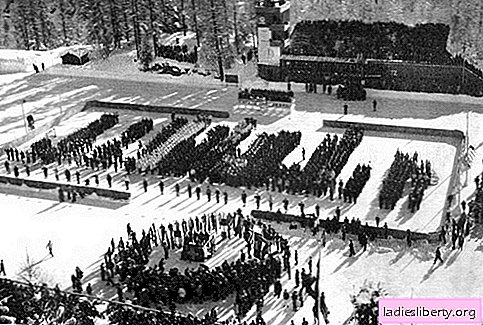
Holidays January 30
Azerbaijan Customs Day
At the end of January in1997, the President of Azerbaijan G. Aliyev issued a Decree in which the date for the celebration of the Day of customs officers in the country was set. This date was chosen due to the fact that in 1993 Mutalibov, who was the president of Azerbaijan, issued a decree, thanks to which it became possible to create a republican Customs Committee. After this event, they created the first customs service, which operated in independent Azerbaijan. Subsequently, the creation of this organization was supposed to strengthen the economic basis of independence, as well as increase the security of the Republic and its economic and political interests. Today, this structure is the central authority that provides security and uninterrupted functionality of the Azerbaijani borders. This organization includes the leadership of the central office, as well as local customs authorities together with subordinate organizations. These organizations include a number of customs offices, airports, maritime posts, and other significant customs offices. The print media published verified data that in 2007, due to the responsible work of the Azerbaijan Customs Committee, about five thousand offenses were recorded, including two hundred, were criminal in nature. The geographical position of Azerbaijan is a place through which many times tried to smuggle drugs. Therefore, drug trafficking occupies a leading position among the priorities assigned to the employees of this service. State authorities provide active financial support to customs officers and provide optimal conditions for their activities.
January 30 on the folk calendar
Anton the winter, Antonina half
Unfortunately, little information has come down to our time about St. Anthony, in memory of which Antonov is celebrated. According to historical data, he lived the reverend in the sixteenth century. It is known that he became the founder of the Novgorod monastery. The holy relics of Anthony were laid to rest in the temple, from which only the foundation remains today. This day was also called Antonina-half. This meant that half the winter had already passed. People said, Antonina came, it means half of winter, and spring is already visible. However, since the weather was warm on this day, the peasants knew that this was a deceptive phenomenon. They said that Anton was cunning on all sides. In addition, people noticed: if the sky was overcast, it’s a blizzard. It so happened that on this day the peasants baked beanboxes symbolizing the sun. By tradition, they mixed in wheat flour with butter, added butter, some eggs and salt. Then all this was mixed with milk and the dough was kneaded, and small rolls were made from this dough. According to tradition, the day of Anton had to dare to damage. To do this, through the path that led to the courtyard, a sharp sickle had to draw a line. The peasants believed that by carrying out this ritual it was possible to drive away the damage.
Historical events of January 30
January 30, 1790 the British first experienced a lifeboat
The history of the creation of special swimming equipment to save people began on January 30, 1790. Then tests of lifeboats began, tests were carried out on the Tyne River, in the north of England. The boats were intended for coastal rescue operations and had to be based on the shore. The small vessel was given the name "Original", the length of the boat was approximately 10 meters, it was equipped with ten oars. Despite the long history and the numerous attempts to create rescue boats, it was the Original boat that has become a relatively reliable boat designed to rescue shipwrecked people. Indeed, before the appearance of boats, most sailors and passengers of ships died due to the lack of basic devices for rescue at sea. By 1839, most coastal stations in Britain were equipped with special lifeboats. The original boat served on the Tyne River Rescue Station for over forty years and saved hundreds of people from death on the water. Nowadays, the safety of people on the water provides a huge number of various devices, devices, ships, helicopters. But the relevance of lifeboats and boats has not decreased in our time. Large passenger sea liners, fishing and merchant ships, as well as ships of the navy are equipped with lifeboats. In the case of a shipwreck, in our time, people in distress have a much better chance of salvation than sailors of the past.
January 30, 1931 Premiere of the film "City Lights"
On January 30, 1931, in New York, in a movie theater on Broadway, a screening of the film, Charlie Chaplin, "City Lights" ("City Lights") took place. Charlie Chaplin received worldwide fame as a brilliant silent film actor. And despite the fact that the films began to be voiced already in 1927, Chaplin defiantly continued to make and act in silent films, until 1937. The actor was dejected that the era of silent cinema, forever leaves the cinema. The new silent film "City Lights" became especially poetic and completely saturated with Chaplinsky cinematic ideology. The film tells about the sincere love of a poor beggar to a blind girl. The film "City Lights", became the eighth full-length picture of Chaplin. The tape has become one of the most popular among the works of Chaplin. In the VIP box of the theater, at the premiere of the film, there were many important and distinguished guests, including the great Einstein. The film was a major success and for several rolling months, earned about half a million dollars. In those days, people said: “Chaplin is famous all over the world and understandable to every viewer, and Einstein’s fame rests on the theory of relativity that nobody understands.” In 1952, Chaplin staged another painting, “Ramp Lights,” the picture still related to love and devotion. However, the film came out with sound.
January 30, 1933 German President Hindenburg appoints Hitler Reich Chancellor of Germany
Hindenburg’s ill-conceived, and partially accepted under political pressure, appointment of Hitler as Chancellor of Germany ultimately led Germany to a terrible catastrophe. President Hindenburg actually gave the country to the Nazis. But whatever it was, Hitler became the brightest and at the same time the darkest figure in the history of mankind. A failed artist, keen on the idea of pan-Germanism, a participant in the First World War and a supporter of radical right-wing parties - this is a short biography of Adolf Hitler. His political advancement began after his accession in 1919 to the party of National Socialists. After only two years, Hitler becomes the head of the party. What is the case, the holding or recognition of his oratory? Perhaps, and that, and another, and the third. After all, in order to realize your oratorical abilities, you need to have a sharp mind and high intelligence. In 1923, Hitler and his team attempted to carry out an armed coup in Bavaria. After an unsuccessful coup, Hitler was arrested and spent in prison for less than a year. In conclusion, he wrote his ideological book, “My Struggle,” which became the basis for building a new German philosophy. In 1932, the Nazi party of Hitler won the elections to the German parliament, and this implied the receipt of the highest political power in the state. The President of Germany, Hindenburg, struck by Hitler's oratory and mental abilities, as well as his highest popularity in society, decides to appoint him to the post of Chancellor of Germany - a key post in the country. This happened on January 30, 1933. A year later, the elderly Hindenburg died, and Hitler became president of Germany, and also became the supreme commander of the German army. Thus, Hitler became the sovereign ruler of power, concentrated in his hands all the power levers.
January 30, 1948 V Winter Olympics opened
The first Winter Olympic Games are the games of 1924, held in France at the foot of the Alpine Mountains. As you know, the Olympic Games are regularly held every fourth year. But World War II violated the regularity of the famous games. The Olympic competitions of 1940 and 1944 were not held because of the war, the world was not in time for sports. The first post-war Winter Olympic Games were the games held in Switzerland, 01/30/1948 they became the fifth Winter Olympic Games. Only 28 countries and nearly 700 athletes participated in these post-war competitions. Most countries, especially those most affected by the war, were unable to send their sports delegations to the Fifth Olympic Games. At the competition, 22 sets of medals were played in nine sports disciplines. Interestingly, after a twenty-year hiatus, skeleton competitions were included in the competition program. The best in these games were American, Swedish and Swiss athletes. That is, representatives of those countries that generally or almost did not suffer from a terrible war. But, in spite of everything, the games of 1948 were the first games after the war and marked the onset of the long-awaited peace.
January 30, 1953 leprosy protection day established
Every year on January 30, World Leprosy (Leprosy) Day is celebrated worldwide. The goal of establishing such a landmark date is to attract the attention of the world medical, civil and political community to the problems of patients with leprosy. Leprosy is a terrible disease, but these are just words, but in fact it is the most severe granulomatosis caused by an infectious agent. The disease affects the skin, peripheral nerve trunks and branches, as well as a number of other body systems. Without modern drug therapy, self-healing does not occur, the disease ends with a deep disability of the patient, but more often to his death. The memory of this terrible disease is preserved in ancient scriptures and manuscripts. Sick leprosy was strictly prescribed not to live in cities and villages, not to approach healthy people. Later, special camps began to be created for them, where they could spend the rest of their lives. In antiquity, especially on the Hindustan Peninsula, they were very cruel with leprosy, they were excommunicated from families, and the families themselves were resettled from the rest of the population as potential carriers of the disease. In some ancient societies, such patients were simply killed, and their remains were burned. At that time, nothing was known about leprosy and was considered to be the punishment of the Lord, certain prejudices associated with this disease have developed over the centuries and even in our time there are cases of leprophobia. The first fighter in the struggle for the rights of patients with leprosy was Raul Follero, who during his lifetime was called St. Francis. He devoted his whole life to the struggle for the rights of patients with leprosy, he organized leper colony for them, and attracted the best scientists and doctors to this problem. In the second half of the 20th century, the secret of leprosy was revealed, it turned out that it was caused by an infectious agent - mycobacterium, the first drugs for the treatment of this disease were developed. Thousands of people began to recover and return to normal life. With the development of medicine, medicines for the treatment of leprosy have improved, and now, with timely treatment and many years of treatment, the patient has a chance of complete recovery.
Born on January 30
Leonid Gaidai (1923-1993), outstanding Soviet film director
Leonid Gaidai was born on January 30, 1923 in the Amur Region. After graduation, he entered the drama theater of the Irkutsk theater, then entered the VGIK. His first film was the tape "Long Way", shot by a young director in 1956. The film was shot based on the Siberian stories of V. Korolenko. The second film was comedy, and later films shot in the comedy genre became his movie masterpieces. It was in the field of comedy cinema that Gaidai reached the pinnacle of his directorial skills and gained the all-Union fame of the brilliant master of cinema. Each of his films became the height of film mastery, his paintings were filled with bright humor, but at the same time they had a socio-political background. Gaidai's favorite historical era was the period of the 1920s, which he emphasized in many of his paintings. Films: "12 Chairs" and "Could Not Be!" bright representatives of that historical reality. Favorite actors of the great director were great artists: Yuri Nikulin, George Vitsin and Evgenia Morgunov. For the first time, the three of them appeared in the short film short film “Dog Watchdog and Extraordinary Cross”. Then there were: "Moonshiners", "Operation" Y "and other Shurik adventures." And his paintings: The Caucasian Captive and the Diamond Arm, are not only the outstanding classics of Soviet cinema, they are recognized as the heritage of all mankind. For services to Soviet cinema, Leonid Gaidai was awarded the title of People's Artist of the USSR.
Louise Augusta (1757-1830), Princess of Hesse-Darmstadt
Louise was born on January 30, 1757 in the family of Count Ludwig IX. The mother brought up the girl, because in Europe, she was considered a very educated woman. She was very friendly with Goethe and other prominent people. In 1772, the All-Russian Empress, Catherine the Great, began to search for a bride for her son, Paul. The Hessian sisters were among the candidates. On June 15, 1773, three princesses came to see the bride to Paul: Amalia, Wilhelmina and Louise. Tsesarevich first chooses his middle sister, Wilhelmina, she accepted the Orthodox faith and became Grand Duchess Natalya Alekseevna. On June 27, 1773, the mother of three sisters was awarded the Order of Catherine. Upon leaving St. Petersburg, Empress Catherine showered the Hessian family with all kinds of favors. Very soon the bridegroom and Louise were found, they became the Duke Karl Augustus, a representative of one of the German principalities. Louise was at the Weimar's courtyard, in which everything was imbued with the Greek style, and the courtyard was filled with a bohemian audience. Louise and Karl had seven children, family life proceeded in a calm and peaceful atmosphere. In 1806, Napoleonic troops invaded the Duchy of Saxony and began to engage in robberies and all kinds of atrocities. At this difficult time for the country, Louise as a duchess remained in her palace. In her house, women, children and the elderly sought salvation. Louise was a kind and pious woman, she helped her people as much as she could, helped people with food, traveled around the capital and comforted people. Soon, Emperor Napoleon arrived in Weimar and met with the Duchess Louise. She met the conqueror with calm and dignity, Napoleon was subdued by the courage and nobility of the Duchess of Louise. He spared the little principality and moved east. So a fragile and “weak” woman without weapons saved her country and her people. She continued to rule her principality until the end of her life; the people called her Grand Duchess Louise Augusta.
Isaac Dunaevsky (1900-1955), an outstanding Soviet composer
Isaac Osipovich Dunaevsky was born in Ukraine on January 30, 1900. In 1910, the family moved to Kharkov, where Isaac began to study at the gymnasium and conservatory. Soon he graduated from high school with a gold medal, followed by the conservatory. After graduation, Isaac begins his career in the orchestra of the Russian drama theater in Kharkov. Noticing the musical talent of Isaac, the main director of the theater, invited the young composer to compose music for performances and operettas. This activity was very successful for Dunaevsky and became the first step to musical fame. In 1924, Dunaevsky moved to Moscow, where he was in charge of the music department of the Hermitage Theater. All-Union fame came to Dunaevsky after the release of the film "Funny Guys", in which the outstanding actors Lyubov Orlova and Leonid Utesov starred. The music for the film was written by Dunaevsky. At the end of the 30s, he led the pop ensemble of railway workers, with whom he later toured on all fronts of the Great Patriotic War. The composer worked hard, he wanted to do as much as possible for his Soviet homeland. The composer is considered the founder of the Soviet operetta.
Olof Palme (1927-1986), twice Prime Minister of Sweden
Olof Palme was born on January 30, 1927 in Stockholm. After leaving school, Palme served in the army. In 1948, he entered a university in Ohio (USA). During his studies at the university, Olof travels a lot in the states. Upon returning to Sweden, he is awarded the degree of Doctor of Law. Soon Palme became interested in politics and in 1956 he was elected to the Swedish Parliament - the Riksdag. Palme passed into parliament as a representative of the Socialist Party of Sweden. From 1963 to 1969, Palme was part of the coalition government, where at various times it holds various ministerial posts. In the 70s, Olof Palme sharply condemned the American intervention in Vietnam. In 1969, Palme was elected the head of the Social Democratic Party, the party managed to form a majority in the Riksdag and Olof Palme was elected Prime Minister of Sweden. At a high public post, Palme began to pursue anti-American politics. In the country's economy, the Prime Minister is undertaking a series of radical reforms and leading Sweden out of a deep economic crisis. In 1976, the Palme party lost the parliamentary elections, and Palme resigned as head of government. In 1982, Palme was re-elected as Prime Minister of Sweden, this time he stayed for four years. In 1986, Olof Palme died in an assassination attempt, the murder has not yet been solved.
Charles Rollin (1661-1741), French historian
Charles Rolen, an outstanding French historian and teacher of the period of European Enlightenment. Together with Montesquieu, he was recognized as the most authoritative historian in Europe. And the famous historian was born on January 30, 1661 in Paris, in a simple working-class family. Thanks to the ability to science and the help of a monk, Rolen was able to go to college and successfully graduate from it. At the age of twenty-two, Charles becomes head of the department of rhetoric. Later, Rolen many times became the rector of the university and the director of the college in Beauvais. With his academic activities and pedagogical talent, Rolen made a huge contribution to the development of French pedagogy and history. He obtained from the French government that all textbooks in the country should not be published in Latin, but in French, which would significantly improve the quality of instruction and advance French education far ahead. He adored the history of France and devoted a large number of works and publications to it. At an advanced age, Rolen began to write the history of the ancient world, this fundamental work was included in the textbooks of the whole world. Indeed, in this historical universal, all spheres of life and activity of ancient human civilization were displayed.
Name Day January 30
George, Savely, Antonina, Victor











